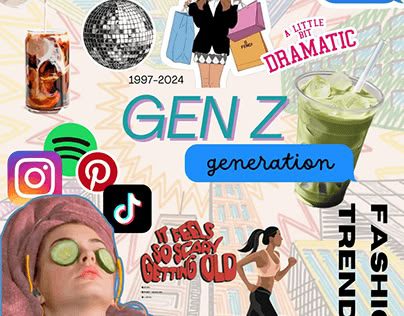In the last few years, the conversation around mental health has undergone a powerful transformation—and Gen Z is leading that change. Born between the late 1990s and early 2010s, this generation has grown up in a world where openness, vulnerability, and authenticity are increasingly celebrated over perfection. From school corridors to Instagram stories and TikTok feeds, mental health is no longer whispered about behind closed doors—it’s being discussed, dissected, and destigmatized in real time.
Unlike previous generations that often-brushed emotional struggles under the rug or labeled therapy as taboo, Gen Z is not afraid to ask for help or to share their struggles openly. Whether it’s creating content about anxiety and depression, journaling their healing journeys, or simply checking in with friends through “mental health check” texts, they’re reshaping how we approach mental wellness.
This cultural shift is deeply rooted in Gen Z’s values—emotional intelligence, inclusivity, and advocacy. Many of them have watched older generations suffer in silence and are determined not to repeat those patterns. Instead, they’re choosing therapy over toxic toughness, conversations over suppression, and growth over guilt. With the help of digital platforms, mental health apps, and a growing network of like-minded communities, they are not only breaking down generational stigma but also setting a new standard for emotional care and psychological safety.
 In this we explore 20 key reasons why Gen Z is boldly rewriting the rules of mental health dialogue—and why their efforts are not just important but revolutionary.
In this we explore 20 key reasons why Gen Z is boldly rewriting the rules of mental health dialogue—and why their efforts are not just important but revolutionary.
A Generation That’s Not Afraid to Feel
Unlike past generations who often avoided discussing emotional struggles, Gen Z is rewriting the narrative. They speak openly about anxiety, depression, trauma, and therapy—online and offline—like never before. Whether it’s through Instagram carousels, TikTok storytimes, or meme therapy, mental health is no longer a hush-hush topic. Instead, it’s part of daily conversation.
The Social Media Shift
Digital spaces have played a huge role in normalizing mental health talk. Influencers, creators, and even meme pages now post about their therapy sessions, coping mechanisms, and moments of vulnerability. TikTok therapists and mental health creators, like @yourdiagnonsense or @drjulie, are making psychological insight accessible and actually relatable. This content acts like a mirror—helping followers name emotions they couldn’t describe before.
“I saw a TikTok that literally explained my childhood trauma better than my school ever could,” says 21-year-old Rhea, a college student from Pune.


Self-Awareness as a Status Symbol
For Gen Z, self-awareness is becoming the new flex. It’s not uncommon to hear phrases like “I learned that in therapy” or “I’m working through that pattern.” Far from being mocked, such statements often earn respect. Therapy has gone from taboo to trend—and not in a superficial way. It’s seen as a proactive step toward becoming a better friend, partner, and version of oneself.
Language Matters: Reclaiming the Vocabulary
Terms like “gaslighting,” “trauma response,” “boundaries,” and “inner child” are now part of Gen Z’s everyday language. While some argue this can lead to overuse, there’s no denying it’s also building emotional literacy. Teens and young adults are more equipped to articulate their inner experiences—and hold others accountable—than ever before.
Still Barriers, But More Awareness
Of course, access to mental health services remains a challenge. Therapy isn’t affordable for everyone, and cultural stigma still exists in many families. But Gen Z isn’t staying silent. They’re creating support groups, anonymous chat spaces, and peer-led helplines. Apps like Wysa, MindPeers, and Therapize are filling the gap by offering low-cost or chat-based therapy.
READ MORE: https://channel6network.com/instagram-growth-young-content-creators-2025/
Calling Out Toxic Positivity
Another big shift? Gen Z isn’t here for fake optimism. They reject the “just think positive” mindset and embrace sitting with uncomfortable emotions. This acceptance of not being okay is what many psychologists consider the first step toward real healing. Instead of hiding pain, they’re saying: feel it, process it, and grow from it.
1. They Talk Openly—Online and IRL
Gen Z discusses anxiety, burnout, and therapy like everyday topics—no shame, just real talk.
2. They Normalize Therapy
For Gen Z, therapy is self-care, not a sign of weakness. Many treat it like a mental gym.
3. Mental Health Is Part of Their Vocabulary
They’re fluent in terms like “boundaries,” “trauma,” “self-regulation,” and “gaslighting”—thanks to social media and podcasts.
4. They Share Their Healing Journeys Publicly
Whether on TikTok or YouTube, many young people document their progress to inspire others.
5. They Advocate for Mental Health in Schools
Gen Z students are pushing for on-campus counselors, safe spaces, and mental health days.
6. They’re Redefining Masculinity
Gen Z boys are breaking emotional stereotypes and embracing vulnerability without shame.
7. They Support Each Other in Digital Communities
Discord servers, Reddit threads, and group chats offer safe spaces for venting and healing.
8. They Value Emotional Intelligence
Being able to process and express emotions is seen as a strength, not softness.
9. They See Boundaries as Self-Respect
Saying “no” is no longer rude—it’s healthy, and Gen Z knows it.
10. They Use Humor as a Coping Tool
Mental health memes help Gen Z laugh through the pain—and feel less alone.
11. They Call Out Toxic Positivity
They reject fake optimism and validate real feelings like sadness and frustration.
12. Their Influencers Lead By Example
Celebrities like Billie Eilish, Selena Gomez, and Emma Chamberlain openly share therapy experiences.
13. They Demand Better Access to Mental Healthcare
Petitions, protests, and content campaigns—Gen Z pushes for therapy to be more affordable.
14. They Don’t Hide Medication Use
Whether it’s antidepressants or ADHD meds, there’s no shame in needing help.
15. They Challenge Family Taboos
They’re starting tough mental health conversations with parents and elders—often for the first time.
16. They Treat Burnout Seriously
Gen Z respects rest and rejects hustle culture when it compromises mental peace.
17. They’re Reframing “Crazy” Narratives
Mental illness isn’t a character flaw. They’re breaking down stereotypes with compassion.
18. They Romanticize Growth, Not Perfection
Self-improvement, journaling, healing crystals, and shadow work are part of the vibe.
19. They Are Educated and Informed
TikTok therapists, YouTube videos, and threads help Gen Z stay psychologically informed.
20. They’re Building a Healthier Future
They’re raising awareness now to ensure future generations grow up with emotional safety.


Closing Thoughts: A Generation That Chooses Healing Over Hiding
Gen Z isn’t just talking about mental health—they’re transforming how the world understands it. By normalizing therapy, setting boundaries, calling out outdated beliefs, and creating safe spaces online and offline, they’re showing that strength lies not in silence, but in self-awareness and support. Their fearless vulnerability is not weakness—it’s radical courage in action.


Their efforts are not only helping themselves but also setting a precedent for younger generations and even encouraging older ones to unlearn stigma. The impact? A future where emotional wellness is as prioritized as physical health, where therapy is as normalized as a fitness routine, and where no one has to suffer in silence.
So, the next time someone opens up about what they’re going through, thank Gen Z—for reminding us all that talking is healing, and healing is human.

